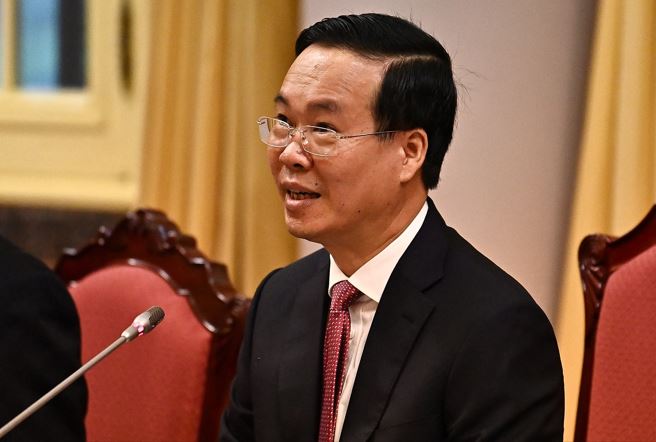
Vietnam’s parliament, on Thursday, approved the resignation of President Vo Van Thuong, the latest high-profile leader to fall as the communist country is roiled by a sweeping graft purge and political feuding.
The ruling Communist Party announced Wednesday that Thuong had quit after barely a year in the job, saying he was guilty of unspecified “violations and shortcomings”.
The 53-year-old’s departure, following days of rumours he was on his way out, comes as Vietnam undergoes major — and uncharacteristic — political upheaval.
The National Assembly — a rubber-stamp body — voted to dismiss Thuong in a closed session at an extraordinary meeting, the state-run Tuoi Tre news website reported.
Vietnam has long prized stability and careful management of political change, but this has been upended by a wide-ranging crackdown on corruption, believed to be orchestrated by party General Secretary Nguyen Phu Trong — seen as the most powerful figure in the country.
The purge saw Thuong’s predecessor, Nguyen Xuan Phuc, forced to resign suddenly last January.
A handful of the country’s top business leaders have been put on trial in huge fraud and corruption cases, with one facing a possible death sentence in a $12.5-billion bond scam case.
The party’s politburo, its key decision-making body, has now lost four of its 18 members since 2021 — two presidents, a deputy prime minister and a former trade minister.
Before Phuc’s resignation last year, only one other Communist Party president had ever stepped down, and that was for health reasons.
Linh Nguyen, a Vietnam analyst at global risk consultancy Control Risks, said the upheaval was a “PR disaster” that threatened the country’s reputation for stability.
Last week, as speculation about Thuong’s future built, the Dutch royal family said Vietnam had cancelled a planned state visit this week by King Willem-Alexander and Queen Maxima “due to internal circumstances”.
The turmoil comes as Vietnam seeks foreign investment, particularly from the United States, to develop its economy away from low-value manufacturing and towards high-tech products such as semiconductors.
US President Joe Biden’s administration wants to massively expand business investment in Vietnam to help it develop a high-tech sector to wean the American economy off its dependence on China.
Linh said it appeared that factions within the Communist Party are already jockeying for position ahead of the crucial party congress in 2026.
“The politicised anti-corruption campaign is getting more intense towards the next party congress leaving even more uncertainty about who’s next,” she told AFP.
“Losing the youngest politburo member and youngest top leader also raises concerns over the ageing leadership in Vietnam as most of them will be overaged by the next party congress in 2026.”
No detailed explanation has been given of Thuong’s “violations”.
But earlier this month, the Ministry of Public Security expanded a probe into an infrastructure development company in three provinces, including central Quang Ngai, where Thuong was formerly the party chief.
The ministry said the Phuc Son company was suspected of falsifying financial statements in order to dodge taxes, and its investigators arrested nine people including five officials from Quang Ngai.
But Linh said the scale of Thuong’s alleged wrongdoing was “likely very small” in the context of the nationwide anti-corruption purge.
Analyst Benoit de Treglode of the Institute of Strategic Research in Paris said internal party machinations over who will replace General Secretary Trong were the more likely cause.
AFP





